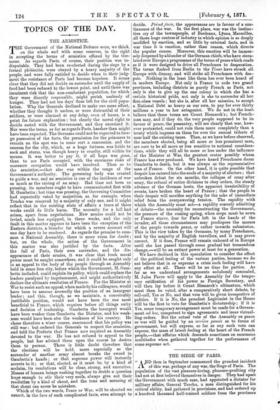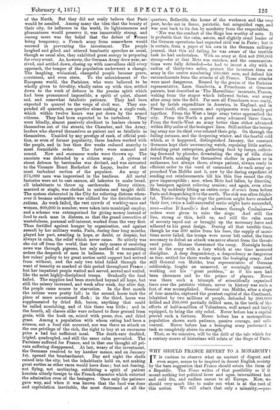THE SIEGE OF PARIS.
"Apr, then in September commenced the grandest incident of this war, perhaps of any war, the Siege of Paris. The population of the vast pleasure-loving, pleasure-profiting city had not at first believed themselves in danger. They had upset the Government with much ease, had appointed a dictator for military affairs, General Trochu, a man distinguished for his critical ability, had gathered in provisions, and had ordered up a hundred thousand half-trained soldiers from the provinces of the North. But they did not really believe that Paris would be assailed. Among many the idea that the beauty of their city, its influence in the world, its lightsomeness and pleasantness would preserve it, was immovably strong, and among more was the belief that the defeat of France being temporary, a French army from somewhere would succeed in preventing the investment. The people laughed and gibed, and uttered bombastic speeches as usual, though as usual also, they exhibited great energy in preparing for every event. As, however, the German Army drew near, ar- rived, and settled down, closing up with marvellous skill every approach, the temper of the population underwent a change. The laughing, whimsical, changeful people became grave, consistent, and even stern. To the astonishment of the European world, the Parisians, who were believed to be wholly given to frivolity, wholly eaten up with vice, settled down to the work of defence in the precise spirit which had been pronounced impossible, a spirit of quiet, almost sad, and somewhat fatalistic patience. They had been ‘expected to quarrel to the verge of civil war. They sus- pended all quarrels, one quartier alone making a single rush, which within twelve hours was put down by the armed citizens. They had been expected to be turbulent. They were blindly, almost passively obedient to leaders chosen by themselves out of the streets, the Chamber, and the Army, leaders who showed themselves as patient and as fatalistic as themselves. Unaided by any prestige of rank, of official posi- tion, or even of former popularity, these leaders worked with the people, and in less than five weeks reduced anarchy to most formidable order. The forts were manned and armed. New and enormous works were thrown up. The enceinte was defended by a citizen army. A system of street defence by barricades was devised, and was entrusted to the Vicomte Henri Rochefort de Lucay, leader of the most turbulent section of the populace. An army of 275,000 men was improvised in the banlieue. All metal factories were set to cast cannon, all bakeries to make bread, .all inhabitants to throw up earthworks. Every citizen, married or single, was clothed in uniform and taught drill. The system elaborated in the City for relieving distress when- ever it became unbearable was utilized for the distribution of zaions. M work NW; the past crowds of wcakin.g-men and women, 800,000 in number, were taken into municipal employ, and a scheme was extemporized for giving money instead of food to each man in distress, so that the grand corrective of wastefulness, personal self-interest, worked from the very first. Thus fortified against hunger by organization, and against assault by her military works, Paris, during four long months, played her part, awaiting in hope, or doubt, or despair, but always in calm, the relief which never came. So utterly was she cut off from the world, that her only means of receiving news was through pigeons, her only method of transmitting orders the despatch of men in balloons. It was no part of her rulers' policy to try great sorties until support had arrived from without, and the only two tried failed through the want of tenacity so marked at this period throughout France ; but her impatient people waited and served, served and waited, like the most highly-disciplined troops. Gradually the food failed. The supplies had been stretched beyond all hope, but still the misery increased, and week after week, day after day, the people came nearer to starvation. In the first month the rations were pretty full; in the second, horse took the place of more accustomed flesh ; in the third, horse was supplemented by dried fish, bacon, anything that could be called nourishing, and of this there was little ; and in the fourth, all classes alike were reduced to flour ground from grain, with the husk on, mixed with pease, rice, and dried grass. Among a population with whom eating had been a science, not a food riot occurred, nor was there an attack on the one privilege of the rich, the right to buy at an enormous price a bad but sufficient meal. The death-rate doubled, tripled, quadrupled, and still the same calm prevailed. The Parisians suffered for France, and in that one thought all pri- vate suffering disappeared. At last, weary of the investment, the Germans resolved to try harsher means, and on January 1st, opened the bombardment. Day and night the shells rained into the city, but the inhabitants held on, not making great sorties as other races would have done; but not fearing, not flying, not mutinying, exhibiting a spirit of patient heroism utterly foreign to the French character which extorted the admiration even of the besiegers. Once only the patience gave way, and when it was known that the food was done and capitulation inevitable, the most distressed of all the
quarters, Belleville, the home of the workmen and the very poor, broke out in fierce, patriotic, but misguided rage, and was sent back to its den by musketry from the respeetables.
"Nor was the conduct of the Siege less worthy of note. It is probable that the calm, astute, and slightly cruel leader of the German operations had expected civil war in Paris ; bat it is certain, from a paper of his own in the German military journal, that this aid failing, he was aware of the terrible task he had undertaken. With an army at first not 200,000 strong—for at first Metz was untaken, and the communica- tions were fully defended—he had to invest a city with a radius of thirty-two miles, protect the investors from an army in the centre numbering 300,000 men, and defend his entrenchments from the attacks of all France. Those attacks were most dangerous. Roused by the genius of the Parisian representative, Leon Gambetta, a Frenchman of Genoese parents, best described as The Marseillaise' incarnate, France, waking from the stupor which followed Sedan, sent army after army into the field. For men all Frenchmen were ready, and by lavish expenditure in America, in England, and in France itself, rifles, cannon, and equipments were hastily got together. From the West a large army twice approached the city. From the North a good army advanced three times. From the South-West an army better than either advanced within fifty miles of the besiegers lines. Still neither the besieg- ing army nor its chief ever relaxed their grip. On through the failing autumn, and the deepening winter, and the fearful cold which, as it happened, distinguished January, the constant Germans kept their unwearying watch, repulsing little sorties, defeating great enterprises, gathering food by forays, collect- ing firewood by plunder, devastating the ring of villa cities round Paris, making for themselves shelter in palaces or in outhouses, but always there, always patient, always ready in efficient order to the word of command. As each army ap- proached Von Moltke met it, now by the daring expedient of sending out reinforcements till his thin line round the city grew imperceptible ; now, when Metz had fallen, by directing its besiegers against relieving armies; and again, even after Metz, by suddenly lifting an entire corps d'arme'e from before Paris and despatching it to the north. The risk was often fright- ful. Thrice during the siege the garrison might have crushed their foes, twice a half-successful sortie might have succeeded,, once—after D'Aurelle's first advance titrougit doulmiere—: orders were given to raise the siege. And still the line, strong or thin, held on, and still the calm man of seventy rayed out or brought up the necessary force and adhered to his great design. During all that terrible time, though he was 300 miles from his base, the supply of muni- tions never failed, the troops were never left unfed, the force necessary to defeat an attack was never absent from the threat- ened point. Disease threatened the camp. Nostalgia broke out in the army with a fury which at one time menaced discipline. A deep despondency, a despondency as dangerous as fear, settled for three weeks upon the besieging army. And still General von Moltke, true representative of German soldiership, fought on unmoved, or seemingly unmoved, working out his " great problem," as if his men had • been chessmen and he the prince of players. Never was there such a triumph of scientifically organized force over the patriotic virtues, never in history was such a feat of war accomplished. General von Moltke, after a siege of four months, captured the greatest capital of the Continent, inhabited by two millions of people, defended by 300,000 drilled and 200,000 partially drilled men, in the teeth of the efforts of half-a-million of Volunteers, well armed and fairly equipped, to bring the city relief. Never before has a capital proved such a fortress. Never before has a metropolitan population shown such patience, passive courage, and self- control. Never before has a besieging army performed a task so completely above its strength."
That, as we conceive, will be the drift of the tale which for a century scores of historians will relate of the Siege of Paris.































 Previous page
Previous page